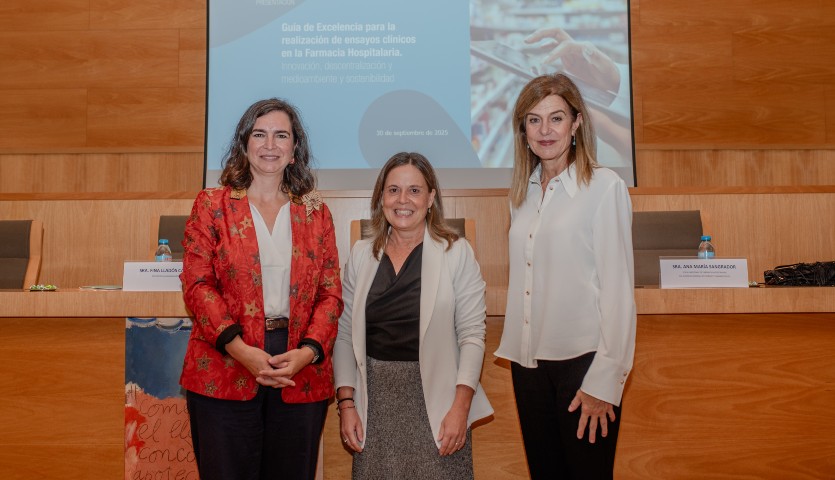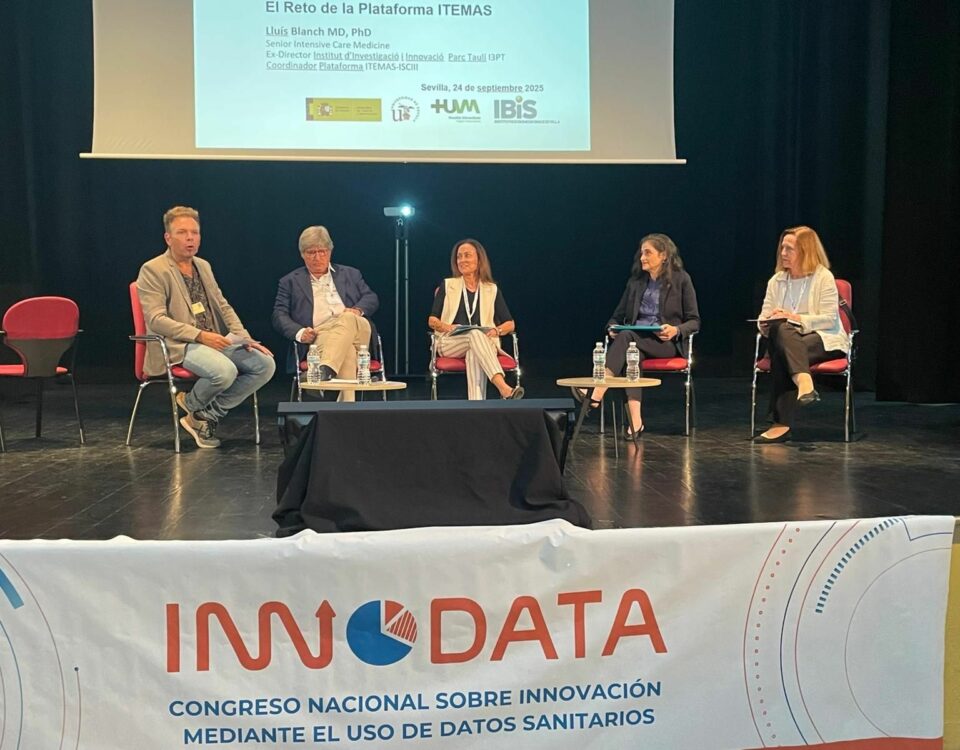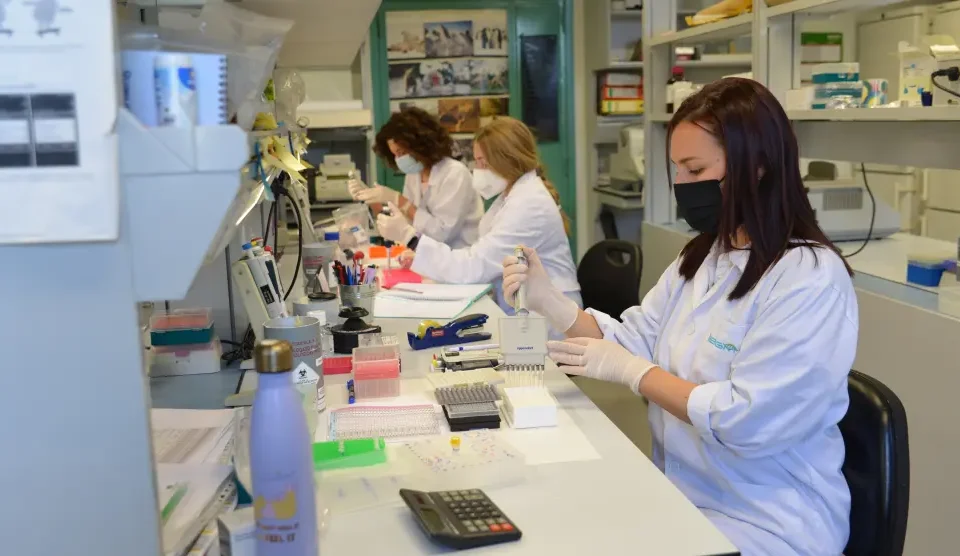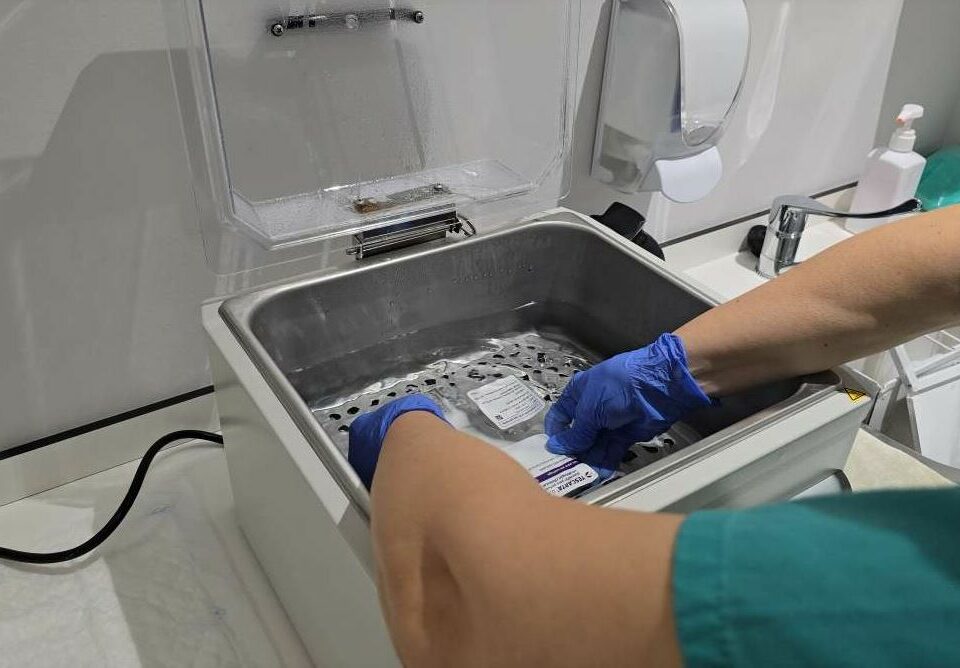Spain consolidates its leadership in clinical trials with new guidelines promoting innovation, digitalisation and sustainability in hospital pharmacy

Pharmacists and industry present the updated “Guide to Excellence for Conducting Clinical Trials in Hospital Pharmacy” in Barcelona.
This is another step towards excellence and improving our country’s competitiveness as an international benchmark in clinical research.
The complexity of new medicines requires greater participation and collaboration from these professionals in the biomedical R&D process.

Cecilia Martínez, president of the Spanish Society of Hospital Pharmacy (SEFH); Fina Lladós Canela, president of Farmaindustria; and Ana Sangrador, national spokesperson for Hospital Pharmacy at the General Council of Pharmaceutical Associations. / Photos: Caro Cle
farmaindustria.es
The Spanish Society of Hospital Pharmacy (SEFH), the General Council of Official Colleges of Pharmacists and Farmaindustria presented the Guide to Excellence for Conducting Clinical Trials in Hospital Pharmacy on Tuesday in Barcelona, at the headquarters of the Royal Academy of Pharmacy of Catalonia (RAFC). Innovation, decentralisation, environment and sustainability.
This document is an in-depth review of the original guide presented in April 2022, which now incorporates issues of relevance to the research of new medicines, such as the impact that innovation, decentralisation, the environment and sustainability have on hospital pharmacy services during the development of a clinical trial.
The use of computerised systems and platforms for trial management has increased and evolved rapidly in recent years, making it necessary to provide guidance in the guide to ensure regulatory compliance with regard to electronic documentation, as well as data security and privacy.
The same applies to decentralised clinical trials —which in Spain are mainly concentrated in Madrid and the Barcelona Metropolitan Area—, which need to be promoted because they involve a greater number of research teams from other regions, as well as providing an opportunity for patients from across the country to participate in these studies, meeting the inclusion criteria of a more diverse population, which will undoubtedly result in better scientific quality of the study data.
The new guide also considers sustainability in clinical trials to be essential in order to balance research with environmental responsibility. The European Green Deal and the EU Strategy on Pharmaceuticals in the Environment establish guidelines to minimise the ecological impact of medicines, ensuring their correct identification, handling, transport, storage, dispensing and disposal in a sustainable manner. The new text also takes into account the environmental commitment of the healthcare sector in clinical trials.
In recent years, Spain has become one of the leading countries in clinical trials, thanks to the strength of its healthcare system, the high qualifications of its healthcare professionals, a responsive government that has promoted pioneering legislation in this area, increasingly involved patient organisations, and a biopharmaceutical industry committed to R&D in our country. Today, 40% of clinical trials conducted in Europe with new drugs involve Spanish participation.
More open and collaborative research
Research into new medicines is becoming increasingly open and collaborative, and future treatments—based on precision medicine, advances in omics sciences, and the application of artificial intelligence and supercomputing—involve greater levels of complexity and demand. For this reason, greater participation and collaboration by hospital pharmacists in the team responsible for developing a clinical trial is necessary, given the added value they can bring throughout the process and to patients.
This Guide to Excellence, now in its second edition, is once again a key reference document in our country, as it highlights aspects that will enable not only the incorporation of innovation in clinical trial management, such as the essential aspects of digital platforms, both for the centre and for the sponsors, but also the implementation of decentralised elements in hospital pharmacy services, from the delivery and collection of investigational medicinal products at participants’ homes to the return and proper destruction of medication, including a complete list of remote monitoring activities. Therefore, this guide complements strategies promoted at the national level by the Spanish Agency for Medicines and Health Products, and I believe it will contribute significantly to underpinning Spain’s position as a leader in clinical research in Europe,” said SEFH President Cecilia Martínez.
‘Furthermore, this guide reinforces the importance of a fluid relationship and mutual understanding of the needs and interests of promoters and hospital pharmacy services, as they are parts of the same mechanism, and collaborations of this kind undoubtedly make it easier to move forward together to continue promoting research in our country and are undoubtedly a model of success that we must continue to work on,’ added Martínez.
The national spokesperson for Hospital Pharmacy at the General Council of Pharmaceutical Colleges, Ana Sangrador, reviewed some of the improvements introduced in the updated guide, concluding that this new version “is an evolution of the 2022 version, maintaining the basis, but expanding significantly to incorporate and detail key aspects of modern clinical research, such as innovation, decentralisation of trials and environmental sustainability.”
In addition, Sangrador wanted to emphasise the importance of the pharmaceutical profession, highlighting the ‘collaboration that must exist between different levels of care in conducting clinical trials in hospital pharmacy, especially in our case with community pharmacies, a necessary coordination that is a priority for the General Council as the unifying body for all pharmacists regardless of their professional field of activity’.
For the president of Farmaindustria, Fina Lladós, “in a context of high competitiveness at a global and European level, in which some countries such as Germany and the United Kingdom are already implementing measures to attract clinical trials, Spain must continue to be at the forefront. Documents such as the one we have presented today, the result of collaboration, help us to continue moving forward with a firm step, to make Spain an increasingly attractive and competitive place for drug research.”
‘At Farmaindustria, we are also working on challenges that are crucial for the development of new medicines, such as streamlining and reducing clinical research management processes, networked clinical trials, promoting research in primary care, the secondary use of data to make clinical research processes more efficient, and greater patient participation,’ said Lladós.
The Guide to Excellence for Conducting Clinical Trials in Hospital Pharmacy, which will continue to be updated as necessary, was created in 2022 with the aim of standardising criteria, improving communication, harmonising and digitising processes in the conduct of clinical trials in hospital pharmacy services, and also aims to respond to the challenges involved in maintaining and improving Spain’s competitiveness as an international benchmark in biomedical research.

Group photo with some of the participants involved in producing the guide.
Farmaindustria.es





